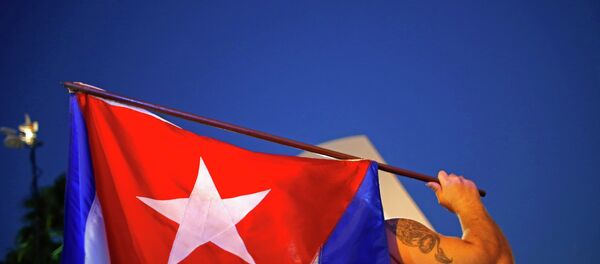"With the decline in the price of oil, Cuba's benefactors, Venezuela and Russia, both are going to be not as able to help economically, so Cuba is seeing a decline in economic assistance from Venezuela and Russia, so that was the incentive on the Cuban part," Jose Azel, Senior Scholar at the Institute for Cuban and Cuban-American Studies at the University of Miami, told Sputnik Friday.
Eduardo Gamarra, Professor at the School of International and Public Affairs at Florida International University (FIU) agrees with the possibility of plummeted oil prices, pushing Cuba to restore its relations with the United States.
As to the United States' incentive to reach the deal at this particular moment, both experts came to the conclusion that it was US president Barack Obama's political move.
"On the part of the Obama administration, I think it is a political move, there is a new Congress taking over at the beginning of the year, he [Obama] may be thinking of his legacy, he wants this to be part of it," Azel said.
Meanwhile Gamarra stressed that Obama "is already a lame duck" and "has no possibility after January to have any influence over Congress", so "it was fairly good timing [to ease trade and travel restrictions imposed on Cuba] before the end of the year".
Gamarra went on, by saying that "you have the anti-imperialist guru [Castro] is all of the sudden talking to Obama, so I think we should expect some interesting sets of discussions, whether that will lead to a very significant change in Russian presence in the region or Russian relations with Venezuela, or even Russian relations with Cuba".
Azel from the University of Miami said that the Obama administration did not pay enough attention to the Russian influence in Cuba.
"The Russian influence in Cuba should have been a great concern to the United States, apparently, it was not to this president," Azel said.
Both experts agreed that US Congress will not lift Cuba's embargo in the nearest future partly because Obama did not gain from the most recent negotiations with Cuba.
"He [Obama] cannot eliminate the sanctions of Helms-Burton law…he is not going to get that congressional action. I don't think Congress is going to eliminate sanctions without concessions from Cuba, remember that the president [Obama] really got nothing out of Cuba, this is very bad negotiations," Azel told Sputnik Friday.
Gamarra agreed that the embargo is not going to be lifted, explaining, however, that in might not be as exclusive as it seems.
"Part of the mythology of the embargo is very interesting, because the reality is the United States is the only country that put a quasi-embargo on Cuba. For the better part of the last decade American farmers and others have, in fact, been selling stuff to Cuba," Gamarra said, adding that there are Brazilian and European investments in the region.
Nevertheless, the experts doubted that new American investment is going to flow into Cuba, even in case the US sanctions are eliminated, because Washington would not agree to partner with the Cuban government.
On Wednesday, President Obama announced that the United States was relaxing trade and travel restrictions on Cuba. An embargo has been in place since 1961 due to Cold War antagonism between Washington and the Communist government in Havana.






